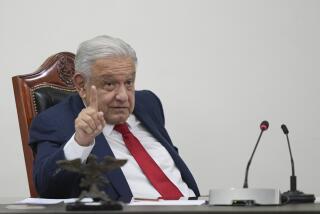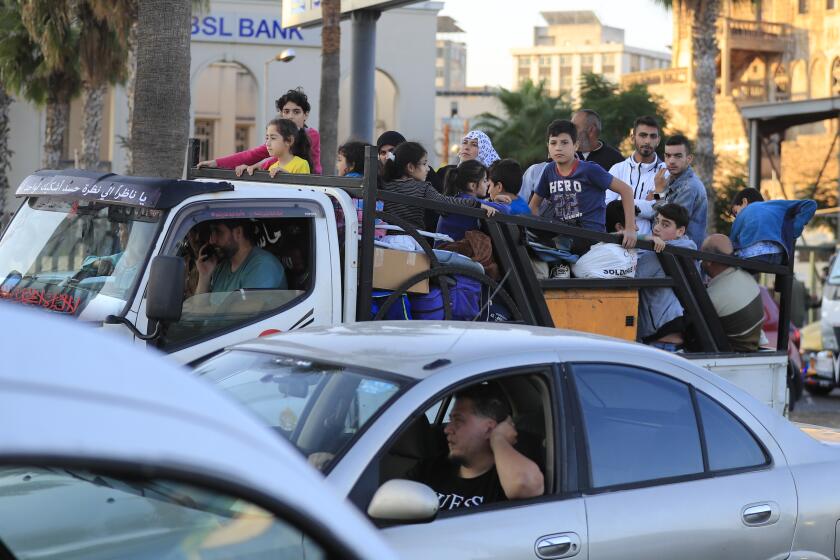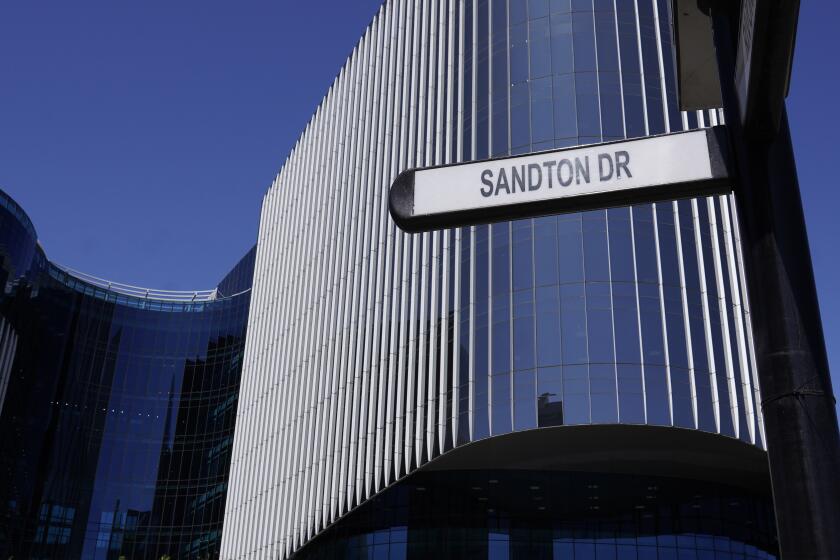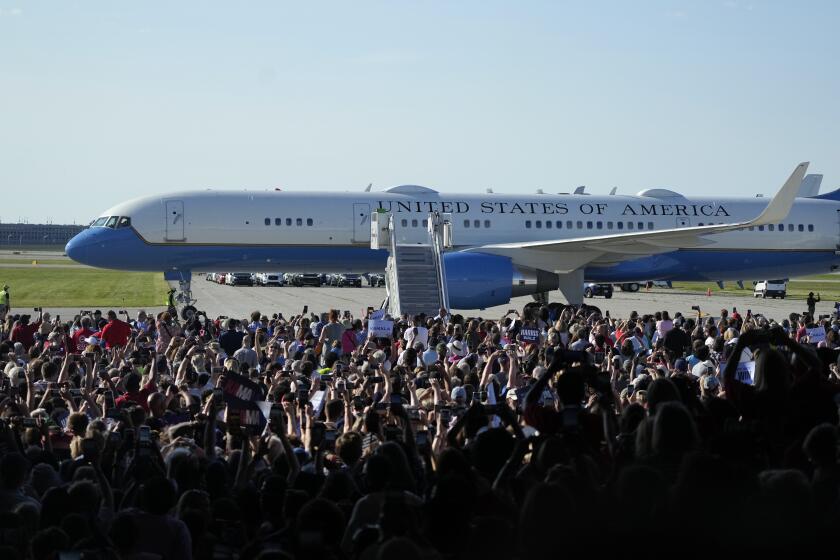Once-Hostile Forces Work Shoulder to Shoulder at Treaty Signing Site : Security: Cooperation between Israel and Jordan illustrates new mood in region. Efforts also reflect fears of terrorist disruption.
Military engineers from the once-hostile armies of Israel and Jordan worked around the clock Tuesday to ready a former desert minefield for the signing here of a treaty that will bring their countries peace.
In an operation that reflected a new era of cooperation, even a kinship, soldiers from the two countries battled a sandstorm, 98-degree heat, then a sudden rain to prepare the new border station for today’s ceremony.
“It’s hard to recall that for two generations we have been enemies,” an Israeli colonel said as he chatted with a Jordanian counterpart about the routes that VIP traffic will follow. “This all seems, well, just so normal.”
Presenting the treaty to Israel’s Parliament in Jerusalem for approval Tuesday, Prime Minister Yitzhak Rabin spoke movingly of an era of peace, friendship, open borders and the growing acceptance of the Jewish state by its Arab neighbors.
“Normalization means an Israeli bus leaving the central bus station in Jerusalem for Amman . . . and planes of the Jordanian airline crossing the skies of Israel on their way to Europe,” he said.
Trucks, he added, “will leave Haifa carrying cargo for Amman; businessmen will fly off in the morning to close a deal (in neighboring Arab countries) and return in the evening to Jerusalem, and families will go off on trips to Jordan and Petra, three hours’ traveling time from Tel Aviv.”
The peace treaty with Jordan will be a major step toward Arab acceptance of Israel’s place in the Middle East, Rabin said, and will bring “a fundamental and substantial change in our very existence.”
For people who have lived for many years in the sights of snipers from the other side, this is quite a change, Rabin reminded the Knesset, Israel’s Parliament. The Knesset agreed and ratified the treaty, 105 votes to three with six abstentions.
Yet in the very preparations for the signing ceremony on their frontier today, there were sharp reminders of the old era in the fears of further terrorist attacks by Palestinian radicals opposed to Arab-Israeli peace efforts.
“They intend to carry out an attack, and we are taking all necessary steps to prevent them from being successful,” Israeli police commissioner Assaf Hefetz warned. While Israeli intelligence had no specific information on targets, Hefetz said police are afraid of an attempt to upset the celebrations.
A massive security operation was under way here to protect Rabin, King Hussein of Jordan and the 5,000 dignitaries, President Clinton among them, who will attend the ceremony.
In a unique operation, Israeli and Jordanian security forces surrounded this border crossing and, working with the U.S. Secret Service, created one of the most tightly protected environments ever for such a major international gathering.
“You set foot in the wrong place and you will have agents from three security services ready to shoot you,” Uri Dromi, director of the Israeli Government Press Office, told photographers preparing to cover the ceremony. “These security guys are very, very serious, and they have to be with so many leaders and top officials from so many countries in just 200 square meters.”
Roads in and out of the area, itself in the middle of an active minefield, have been closed, with thousands of troops patrolling both sides of the border. More than 1,000 security personnel will protect the site and the guests.
An even bigger security operation is under way in Jerusalem in preparation for Clinton’s visit there Thursday and Friday.
Israel is deploying more than half of its 21,000 police to protect Clinton. Jerusalem, which normally has about 6,000 police, is getting more than 4,000 additional personnel for the President’s short stay, and more than 1,200 are being deployed along the highway from Ben Gurion International Airport near Tel Aviv to Jerusalem.
The United States has airlifted hundreds of security people and planeloads of equipment into the Middle East to protect the President in the wake of recent terrorist attacks.
“The Americans want to close the whole country,” police spokesman Eric Bar-Chen said when asked about plans to close the Tel Aviv-Jerusalem highway, one of Israel’s busiest.
Police warned Jerusalem residents that trips around the city by Clinton’s 100-vehicle motorcade on Thursday and Friday will halt almost all normal traffic.
“If you don’t need to be in Jerusalem that day, leave, and if you must be here but can stay at home, do so,” a police commander advised Israelis. “If you must travel, allow an hour for a 10-minute drive. . . . People will need a year’s worth of patience during these two days.”
The greatest danger, security officials say, will come if Clinton tours Jerusalem’s walled Old City late Thursday night, as planned. Although police have flooded into the city this week, security officials fear that a Clinton Old City walk will bring out stone-throwing Palestinian youths who know the roofs far better than they do.
But that planned walking tour has stirred controversy.
To underscore the American position that Jerusalem’s status is an unresolved question, the White House said it did not want Mayor Ehud Olmert to accompany the President when he visits the Church of the Holy Sepulcher, Al Aqsa mosque and the Western Wall of the old Jewish temple.
Rabin is committed to the concept of a “united Jerusalem (as) the eternal capital of the Jewish people and State of Israel,” but he is loath to offend a President who is friendlier to Israel than any in decades. “We’ll find a way,” a Rabin aide said. “The President will get his midnight walk through the Old City, but maybe with a priest, a rabbi and an imam rather than a mayor.”
Rabin, proud of the treaty he reached in negotiations with Hussein, accepted that it alone will not end terrorism but called it a major step toward that goal.
“We have lived with terrorism for a long time,” he told the Knesset. “There are those who ask what is the point of peace if terrorism still exists.
“I can only promise that at the end of the road we will defeat it,” he said. “Peace is the only way to isolate terrorism. Peace will show the nations of the region that there is an alternative.”
More to Read
Sign up for Essential California
The most important California stories and recommendations in your inbox every morning.
You may occasionally receive promotional content from the Los Angeles Times.










